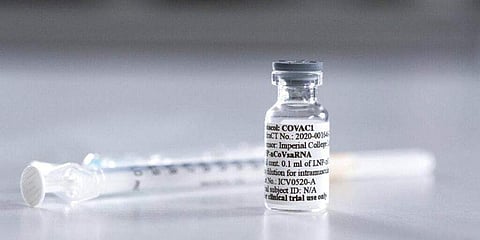

Nudges sent via text messages to patients prior to a primary care visit can boost vaccination rates against influenzas including COVID-19, a study shows.
The study published in Proceedings of the National Academy of Sciences of the United States of America (PNAS), shows that texts messages sent to patients prior to a primary care visit and developed by behavioural scientists to encourage vaccine adoption can substantially boost vaccination rates by an average of five per cent at close to zero marginal cost. In a study of 47,306 individuals in the United States, researchers found that sending two text messages- one sent 72 hours before a primary care visit and another sent 24 hours before the visit- about getting an influenza vaccine in which the vaccine is described as reserved for the individual's visit increased vaccination rates by at least 6.7 per cent.
Results suggest that similar interventions via text message may boost vaccination rates for other illnesses, such as COVID-19, according to the authors. In order to identify the impact of text messaging interventions on vaccination rates, the experiment was conducted in 2020 in partnership with two large health systems in the Northeastern United States: Penn Medicine and Geisinger Health.
The research was approved by the Institutional Review Board (IRB) at the University of Pennsylvania; the IRB granted a waiver of consent for this research. It tested 19 nudges delivered to patients via text message and designed to boost the adoption of the influenza vaccine. The research found that a successful script could be used as a template for campaigns to encourage the adoption of life-saving vaccines, including against COVID-19.
Patients with new or routine (nonsick) primary care appointments at Penn Medicine between September 24, 2020, and December 31, 2020, and at Geisinger Health between September 28, 2020, and December 31, 2020, meeting the eligibility criteria were included in the study. Twenty-six behavioural scientists worked in small teams to generate 19 different text messaging protocols. The best-performing message, which increased adoption by an estimated 11 per cent, reminded patients twice to get their flu shot at their upcoming doctor's appointment and mentioned that a shot was reserved for them. "Our findings show nudges sent via text messages to patients prior to a primary care visit and developed by behavioral scientists to encourage vaccine adoption can substantially boost vaccination rates at close to zero marginal cost," the paper read. "Our best-performing message, which increased adoption by an estimated 11%, reminded patients twice to get their flu shot at their upcoming doctor's appointment and mentioned that a shot was reserved for them. Although the factors influencing the adoption of vaccines for other diseases, including COVID-19, differ in important ways, this successful script could potentially be repurposed," it added.
